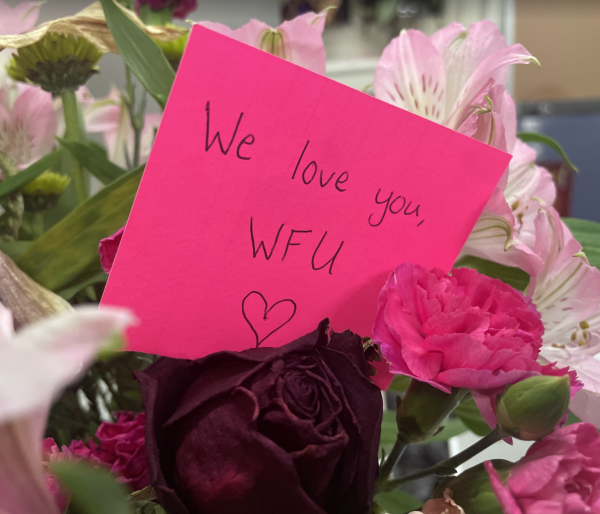When I saw the picture from the 1982 yearbook of the Kappa Alpha Order in front of a Confederate flag, I was shocked.
But the shock was not because of the prominent display of the flag that symbolizes the legacy of white supremacy and racism. It was because the Martha Allman whom I have worked with for many years and whom I continue to admire and respect was in front of it. The Martha Allman I know is not a racist. She has lived her adult life working to provide the opportunity for an education to countless students from diverse social and economic backgrounds. She was at the forefront of the decision to become SAT optional because she believed the test acted as a profoundly unfair barrier to equal educational opportunity. She raised two daughters, both of whom I have taught, who are deeply committed to social justice. She belongs to one of the few racially integrated churches in the city — a church that preaches and practices the social gospel. She does not deserve to become the sacrificial lamb for Wake Forest’s long and troubled past with institutionalized racism.
The reason I wasn’t shocked by the display of the flag was because I experienced that shock more than three decades ago when I came to Wake Forest in 1985. The KAs were still publicly flying the flag as part of their “tradition” and “Southern Pride,” despite complaints from faculty, students and the newly created office of minority affairs. A faculty member in the English department had a sign bolted to his door with a rebel waving the flag, which he used to intentionally provoke the only African-American English professor at the time. A few years later a student publication funded by outside money routinely attacked and ridiculed endowed chair Professor Maya Angelou. In my classrooms, I came to realize that many of my white students who had grown up in the South (which was most of them at that time) had learned a substantially different version of the Civil War than I had growing up in Pennsylvania. “The Civil War wasn’t about slavery; it was about the constitutional principles of state’s rights and limited government.” “Slavery would have died out eventually because it wasn’t an economically sound practice.” “Most southerners didn’t own slaves.” I was stunned the first time I heard these things, but once I came to expect it, I turned it into a lesson about political socialization and how we come to hold the political views we do. When we are young, we tend to believe what our parents and teachers tell us is true. Many people never move beyond that, but many more do and through further education and experience, come to have quite different understandings of themselves, others and the world they live in. For this reason, I take Martha Allman at her word that she experienced a similar growth and transformation.
If the price to be paid for being in that picture is a public shaming in Wait Chapel, a much larger stage will need to be built to hold all the people associated with Wake Forest who in their adult lives used their power and influence to perpetuate racist practices and make the campus climate hostile to students of color, or in other cases, failed to use their power and influence to stop it. The professor who taunted his colleague. The others who stood by and let him do it. The faceless adults with money to fund a mean-spirited, anti-intellectual rag that took pleasure in harassing a gifted poet who we were fortunate to have on our campus. The fraternity advisers who didn’t point out to their members the inappropriateness of their symbols and traditions. The powerful alumni who, behind the scenes, mobilize every time there is any perceived threat that the university might try to rein in or punish very bad behavior on the part of some fraternities. The ones who harassed our former Muslim chaplain on a regular basis. The ones who inundated the university with criticism when it decided to go SAT-optional, claiming we were lowering our standards or making far more explicit racist comments. It would be a very crowded stage indeed.
Let me be clear that I stand with the students in their demands that the university reckon with its past and atone for its sins. I cannot, however, agree that Martha Allman must be the face of all that has been done wrong. For me, she is the face of how to grow up, move beyond one’s narrow upbringing, develop empathy for others and devote your life to making your corner of the world a better and fairer place. If there is no statute of limitations on being a thoughtless young person, I am not sure what those of us who are in the education profession are doing. I teach every day because I believe in the transformative power of knowledge. I support a culturally diverse curriculum because I believe our students arrive on campus with far too narrow a view of the world. The demands of the student activists include curriculum change as well as other educational efforts to reckon with the past. If people can’t change, if the errors of their youth can never be forgiven, then what possible value would any of these efforts have?
Katy Harriger
Professor of Politics and International Affairs













Hank Wordsworth • Apr 1, 2019 at 5:37 pm
Yes, we have a lot in common TD, but please let Dr. Harriger answer
Hank Wordsworth • Mar 31, 2019 at 11:20 pm
So, Dr. Harriger, where do you stand on re-runs of The Dukes of Hazzard?
TD • Apr 1, 2019 at 3:58 pm
Hank
Where do you stand on re-runs of inane comments?